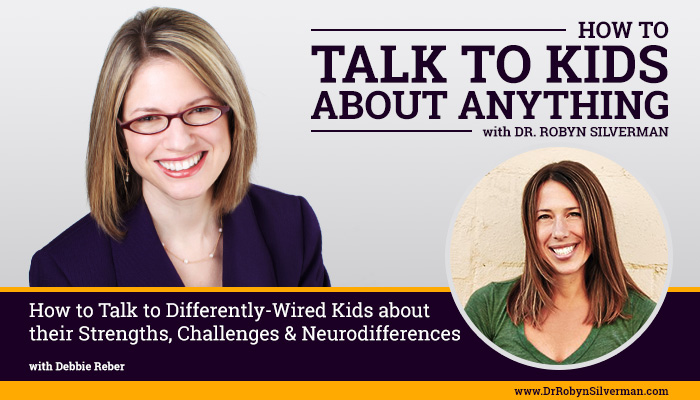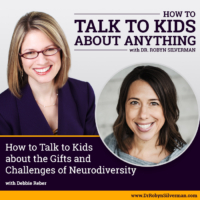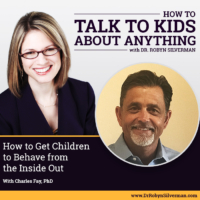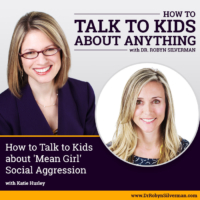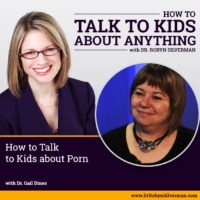Podcast: Play in new window | Download
Subscribe: Apple Podcasts | RSS | More
How to Talk to Kids about Differently-Wired Children
This podcast is about “differently-wired” children and how to talk to these neuro-diverse children about their diagnoses, strengths and challenges. Debbie Reber, author of the forth-coming “Differently Wired,” provides tips and scripts to best help us understand and support exceptional children to navigate our conventional world. Listeners will come away with specific tools as well as ways to help neuro-diverse children thrive and see the gifts of their diagnoses.
Special Guest: Debbie Reber
Debbie Reber is a New York Times bestselling author and the founder of TiLT Parenting, a website, top podcast, and 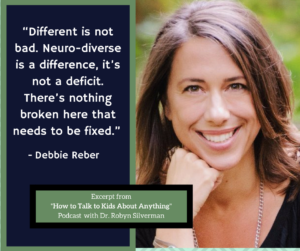 social media company for parents who are raising differently wired children. Her next book, Differently Wired: Raising an Exceptional Child in a Conventional World, comes out in June 2018. She currently lives with her son and husband in the Netherlands. Check her out at http://www.tiltparenting.com
social media company for parents who are raising differently wired children. Her next book, Differently Wired: Raising an Exceptional Child in a Conventional World, comes out in June 2018. She currently lives with her son and husband in the Netherlands. Check her out at http://www.tiltparenting.com
We are in a world that often checks us all off by category. We are a kid or an adult, a girl or a boy, in a certain grade, a certain weight category, height category and so on. These demographics make it easy for us to make assumptions about who each person is and how each group, whether by age, grade or appearance is likely to show up in this world. But millions of kids today more through school, our communities and the world differently than other kids. Perhaps they are highly sensitive or are diagnosed with ADHD or autism, anxiety, dyslexia or some kind of learning difference that makes certain situations more challenging for them than for their peers. They are, as my next guest puts it, differently wired- they are exceptional children living in a conventional world. So how can these awesome children thrive in schools and communities that don’t always bend to difference? To help us understand differently wired children and how we can become a resource, support and advocate for these children in our lives, we are turning to my friend and colleague, Debbie Reber.
The podcast provides:
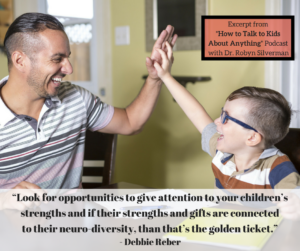 Tips: How to give people the information they need so that they can better support your child, how to help your differently-wired child, how to avoid the compare and despair cycle when your child isn’t doing the same thing at the same time as their peers. Also, how to help teachers/coaches best support, understand and be ready for your child.
Tips: How to give people the information they need so that they can better support your child, how to help your differently-wired child, how to avoid the compare and despair cycle when your child isn’t doing the same thing at the same time as their peers. Also, how to help teachers/coaches best support, understand and be ready for your child.- Scripts: How to explain the neuro-differences between people and how it may impact the child him or herself. Must-have dialogues with younger and older kids who are neuro-diverse. How to talk to neuro-typical kids about differently-wired kids.
- Perspective of a mother of a neuro-diverse child who is successfully assisting her son in gaining the skills to navigate our conventional world as well as developing confidence along the way.
Important Messages:
- We don’t need to “fix” different-wired kids. They are different- not broken.
- 1 in 5 kids is neuro-diverse.
- It’s human nature to compare and despair. But all kids are on their own timelines. Be careful about getting into the
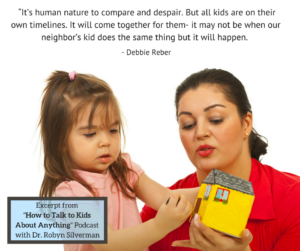 “compare and despair” cycle since they already know that they aren’t “keeping up” with others- they don’t need parents and teachers to highlight this and make them feel bad!
“compare and despair” cycle since they already know that they aren’t “keeping up” with others- they don’t need parents and teachers to highlight this and make them feel bad! - Teach your differently-wired children- look for progress within your own self!
- Arm your children with information so they can stand up for who they are.
- Talk to neuro-typical children about differently-wired children so that the neuro-typical children can become true allies.
- Neuro-diverse kids can have big reactions- talk to neuro-typical kids about what happened, why it happened, so that they can understand.
- Neuro-diverse kids can feel things intensely- but if we discuss this with them, it doesn’t need to be a drawback—it give these kids the opportunity to live a very full life.
- Check in with yourself about your own views about neuro-diversity- are you holding on to stigma of neuro-diversity?
Notable Quotables:
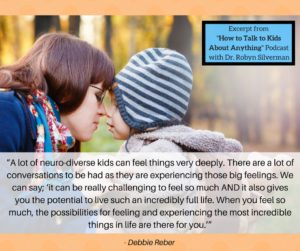
- “Different is not bad. Neuro-diverse is a difference, it’s not a deficit. There’s nothing broken here that needs to be fixed.”
- “I believe, very deeply, that we do ourselves, society and most of all, our kids, a disservice when we’re not open with them about who they are.”
- “I think it’s really important that we, as parents raising differently-wired kids are transparent and open in a way that still feels safe. We set the tone for how our kids are going to be perceived and how we, and peers, can experience difficult moments with our kids. You don’t have to walk around with a mega-phone but we can be open about it and use open language that is confident and matter-of-fact. This is information. It’s not a disease. It gives people the opportunity to be in-the-know so that they feel they have the tools they need. It’s not something to be afraid of, it’s something they need to be aware of so that they can better support the child.”
- “It’s human nature to compare and despair. But all kids are on their own timelines. It will come together for them- it may not be when our neighbor’s kid does the same thing but it will happen. We need to remind ourselves that our kids are on their own timeline but their future is not written and there is no limit to what our kids can do.
- “We want kids to feel confident in who they are and recognize the gifts that come with their diagnoses so that they feel empowered to speak up for who they are.”
- “Neuro-typical peers can become true allies. I believe this is where so much work can be done in fostering a
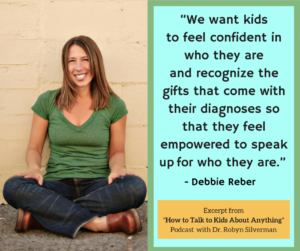 generation where we can reduce the stigma of neuro-diversity. When kids are younger, they just see difference as difference. I think it’s really important to introduce conversations with cousins, the kid down the street or a child from a playgroup. Talk to them about it. Bring the kids in. Talk about it openly. When you do that, kids can stand up for these kids…when we do this at a young age, our kids grow up thinking ‘this is just another piece of who this person is and I can support and understand them instead of otherizing them.’”
generation where we can reduce the stigma of neuro-diversity. When kids are younger, they just see difference as difference. I think it’s really important to introduce conversations with cousins, the kid down the street or a child from a playgroup. Talk to them about it. Bring the kids in. Talk about it openly. When you do that, kids can stand up for these kids…when we do this at a young age, our kids grow up thinking ‘this is just another piece of who this person is and I can support and understand them instead of otherizing them.’” - “Look for opportunities to give attention to your children’s strengths and if their strengths and gifts are connected to their neuro-diversity than that’s the golden ticket.”
- “A lot of neuro-diverse kids can feel things very deeply. There are a lot of conversations to be had as they are experiencing those big feelings. We can say; ‘it can be really challenging to feel so much AND it also gives you the potential to live such an incredibly full life. When you feel so much, the possibilities for feeling and experiencing the most incredible things in life are there for you. There are pros and cons but it’s really fantastic that you can feel things this deeply.’”
- “There is strengths in everything.”
- “My biggest dream is that people stop looking at difference as a deficit and know that these are not children who are broken, it is not a disease. Being neuro-diverse is a fascinating thing. These kids are the change-makers of the future, they are creative problem-solvers and incredible humans and I think we are all responsible for helping them reach their potential.”

